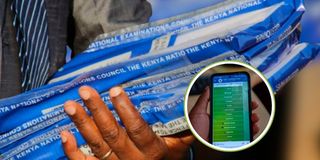
Scammers have been luring candidates, parents and teachers to send them money with the promise of sending exam papers.
When Collins Kipchumba went to a local club with his girlfriend on Sunday night to watch the English Premier League match between Arsenal and Chelsea, he was unaware of the prying eyes of detectives from the Directorate of Criminal Investigations (DCI) watching his every move.
The day before, the detectives had followed him to Ngata area in Nakuru City where he was playing pool with his friends, but did not arrest him because they were not yet sure he was their quarry due to his multiple online identities.
Mr Kipchumba was also unaware that on the same day, Stephen Nyang'au Mbeche was arrested in Masaba North in Kisii County for a similar offence for which he was being sought.
After the match ended in a 1-1 draw, the 23-year-old human resource management graduate retreated to his rented house in Nakuru's Kiamunyi area.
“We had been working hard to identify him but it wasn’t easy because he was using a profile and name of a woman who we later came to discover is his mother. She lives in Sacho, Baringo County,” a detective involved in the operation told Nation.Africa.
The suspect had used a number registered under his girlfriend's identity card number to receive the money sent by unsuspecting Kenyans seeking to cheat in the Kenya Certificate of Secondary Education (KCSE) exams.
The DCI had earlier requested Safaricom to provide records of transactions made on the number to determine the amount of money the suspect had collected by the time of his arrest.
The detectives spent the night near Mr Kipchumba's rented house. After further analysis, they were sure they had their man. He was of particular interest because the following day (Monday), KCSE candidates would sit their Mathematics Alternative A exam in the morning and Kiswahili Fasihi in the afternoon.
According to the DCI, Mr Kipchumba was on their radar because he runs a WhatsApp group where he posts doctored images of KCSE exams that he claims are real. He allegedly uses them to convince candidates, their parents and teachers to send him money.
Another female detective was instrumental in verifying his identity. She posed as a businesswoman who wanted to relocate in the neighbourhood. As the caretaker was away, she approached Mr Kipchumba to inquire about the availability of a house and the amount of rent.
After being shown around, she left, promising to return in three hours with her "husband". She joined her colleagues to plan how to raid the house.
When she returned with her supposed husband, they found Mr Kipchumba in the house with his girlfriend and arrested him. They then searched the house for exam papers. They did not find any, but proceeded to confiscate his equipment, which was taken to the DCI headquarters for further forensic examination.
Mr Kipchumba was arraigned at the Nakuru Law Courts on Tuesday but did not enter a plea as the police asked for more time to complete their investigations. The court granted them seven days and the suspect will return to court on Tuesday next week.
According to detectives, the suspect took pictures of exam papers that were shared on other platforms after the exam packets had been opened.
“He’d alter the time on his phone and send himself the images of the day’s examinations then screenshot it. When sent to the group he’d created, it would appear as though he had access to the paper much earlier at 4am. This would make more people believe him and send money,” the detective said.
He said that Mr Kipchumba had been charged with unauthorised possession of examination materials, illegally soliciting for money from the public and fraudulently obtaining money from the public.
Nation.Africa last week revealed how scammers have been luring unsuspecting candidates, parents and teachers to send them money with the promise of sending examination papers.
A number of the active groups, particularly on the social networking site Telegram, have since been shut down. Detectives said that most of the doctored images used by other groups originated from Mr Kipchumba’s group.
They said that a number of teachers from across the country had also been arrested and charged with examination malpractice.








